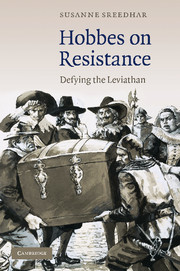2 - The true liberties of subjects
Published online by Cambridge University Press: 04 April 2011
Summary
The Hobbesian right of self-defense is, as has been demonstrated, far more intriguing and defensible than it initially appears; however, it represents only the very beginning of Hobbes's theory of resistance rights. Much of the substance of this theory actually lies in the rights that Hobbes derives from the original inalienable right of self-defense. He calls these corollaries the “true liberties of subjects,” which he defines as “the things which, though commanded by the sovereign, he [the subject] may nevertheless without injustice refuse to do.” There are references to these corollary rights throughout his texts, but the dedicated discussion of them is in Chapter 21 of Leviathan. The brief list of the corollaries is as follows:
(1) Subjects have the right to resist physical harm and confinement.
(2) Subjects are not obligated to incriminate themselves or certain others, including those whom they love or depend upon.
(3) Subjects may have the right to disobey dishonorable or dangerous commands, including those requiring military service.
Much commentary on Hobbes's political philosophy simply ignores his discussion of the true liberties of subjects. When it is addressed in detail, it is often denigrated. In a representative remark, Glenn Burgess refers to these corollary rights as “peripheral, of little practical political significance, perhaps even embarrassing logical implications of his own theory that Hobbes would have liked to sweep under the carpet.” Similarly, Kavka characterizes Hobbes's discussion as filled with “imprecise claims and weak arguments.”
- Type
- Chapter
- Information
- Hobbes on ResistanceDefying the Leviathan, pp. 53 - 88Publisher: Cambridge University PressPrint publication year: 2010

